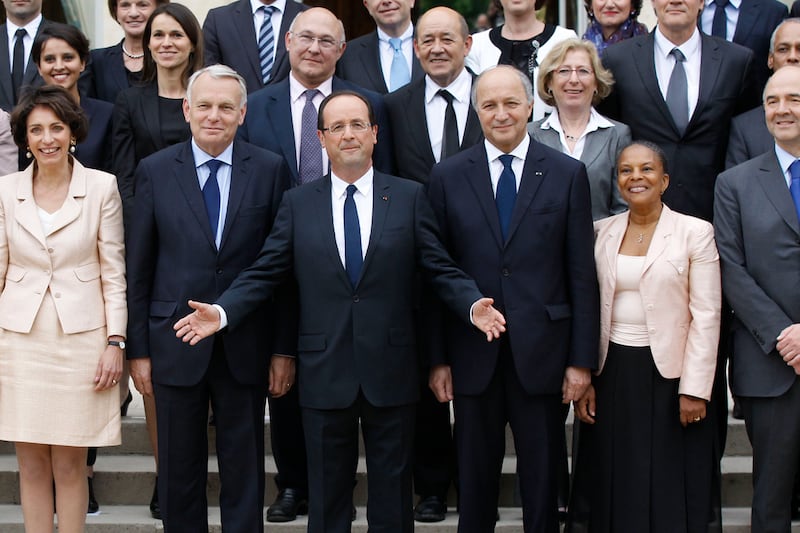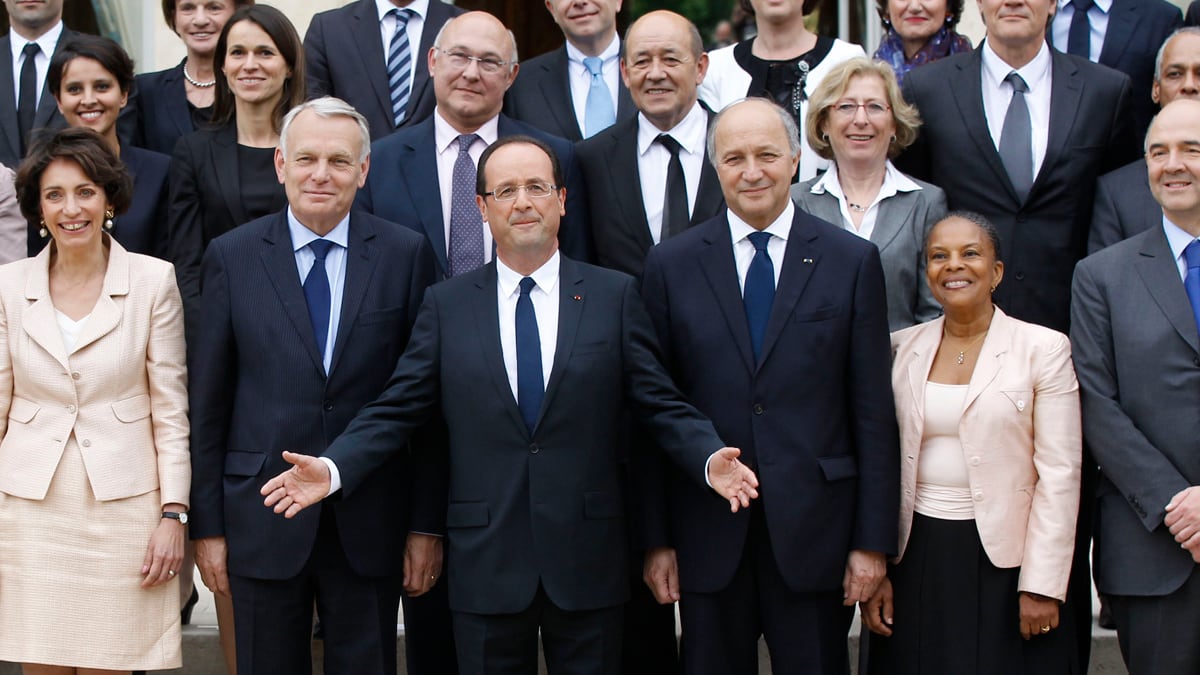New French President François Hollande weathered the storm on inauguration day—sopping wet in an open-topped car on the Champs Elysées, his plane struck by lightning on a trip to Berlin. On Wednesday, he stacked his new cabinet—the first gender-equal cabinet in French history, 17 men and 17 women—with moderate social-democrats at key posts that should reassure markets. Now Hollande faces a baptism of fire on the world stage. After his first meeting with President Barack Obama in Washington on Friday morning, the spotlight will be on Hollande at back-to-back summits in the United States this weekend.
For a new world leader short on international experience, the Socialist Hollande is poised to catch up tout de suite. The French president meets his American counterpart for a tête-à-tête at the White House only three days after taking office. Hollande then travels to Camp David on Friday and Saturday for his first summit of G8 economic powers, dominated by deep concerns over the European debt crisis. On Sunday and Monday, Hollande joins transatlantic leaders at a NATO summit in Chicago. And two days later, amid persistent fears over Greece's economic future, he meets with 26 fellow European leaders at an informal summit in Brussels.
Hollande had never met Chancellor Angela Merkel, his most important partner at the heart of Europe, before their meet-and-greet dinner Tuesday night, hours after his inauguration. By next week, he'll have spent five of his first nine days in office with her. Add a G20 summit in Mexico next month, and the new guy in the Elysée Palace will already know anybody who is anybody.
Hollande's foreign-policy differences with his iconoclastic predecessor, Nicolas Sarkozy, have made bigger headlines than their common ground on issues like Iran or Syria. But French officials in Paris are nevertheless expecting Hollande's first foray into global summitry in the U.S. this weekend to be a smooth one.
There is the matter of his campaign promise to withdraw France's 3,400 troops from Afghanistan by the end of 2012. Over the course of his campaign, the Socialist candidate made increasingly conciliatory noises on the matter. He specified that the drawdown would affect "combat" troops, hinting at some wiggle room in the ultimate calendar, and suggested he wouldn't put French troops at risk with a rushed exit. Sarkozy meanwhile had settled on a 2013 withdrawal—ahead of NATO's scheduled drawdown, and Obama's favored timetable, in 2014.

"I truly believe that [the withdrawal promise] will not pose any difficulty during Hollande's American trip. You will see that it will not be a subject of conflict," a French source inside the Elysée Palace's diplomacy unit told The Daily Beast, arguing that Hollande has been clear and has taken the time to explain the pledge. The source notes that immediately after Hollande won office May 6, the president-elect's diplomatic "sherpa" met with American counterparts and a White House delegation sent to Paris to discuss the G8 and NATO summits.
"There are no irritants. There are no difficulties," the confident French source tells The Daily Beast. "All of that [the French withdrawal] was announced well in advance, so there is no drama surrounding that." He notes that Afghan President Hamid Karzai, whom Hollande will meet in Chicago, told the French leader that he understands his decision; Afghan authorities have already announced a transition of security control to Afghan forces in Kapisa province, where French soldiers are based. "As far as the American president is concerned, I think it is a decision that can be made intelligently with them [sic]," says the Elysée diplomat. "And that is the message Hollande will carry to Washington and Chicago."
Despite Sarkozy's claim on the nickname "Sarko, l'Américain," it bears recalling that Hollande's predecessor's commitment to Afghanistan fluctuated. During his 2007 campaign, Sarkozy floated the idea of a withdrawal of France's troops, only to pledge after he had won office to stay "as long as it takes" and eventually commit thousands more troops, during a term in which Sarkozy had France rejoin NATO's integrated military command after a 43-year absence. In January of this year, when four French troops were killed by an Afghan soldier (a fifth died months later in hospital), Sarkozy suspended French training missions in Afghanistan before deciding to hasten France's commitment there by one year, to 2013. (At the time, a poll showed that 84 percent of French people surveyed wanted the troops home by the end of 2012, in line with Hollande's campaign promise.)
At the very least, under Hollande, there is reason to believe the United States will find a less unpredictable ally. Sarkozy thrived on surprises, domestically and on the world stage. Initiatives were regularly taken directly at the Elysée Palace, with little outside consultation, sparking anger among members of France's foreign ministry, the so-called Quai d'Orsay. (Sarkozy is, after all, the man who went to war in Libya on the prompting of an open-shirted Left Bank philosopher.) In February 2011, an anonymous collective of diplomats took the rare, rebellious step of publishing a bitter op-ed in Le Monde against Sarkozy's exercise of power, blaming "amateurism, impulsiveness, and short-term media concerns" for errors including Paris's botched early reading of the Arab Spring. (Days before Tunisia's dictatorial regime finally fell under pressure from protesters in what would be called the Jasmine Revolution, Sarkozy's foreign minister offered "the savoir-faire of our security forces" to help quell the unrest. She would later resign.) The op-ed diplomats claimed that a data dump, a "Wikileaks à la française," would have shown the embassies' analyses had been spot on.
In Hollande's inauguration speech on Tuesday, the new president promised, very generally, that he won't do all the deciding from the palace, suggesting he is keen to let other institutions play their traditional roles. (Aside from correcting a presidential taste under Sarkozy for bling, that is the heart of Hollande's curious pledge to be a "normal" president.) The new president's decision to nominate an experienced former prime minister, Laurent Fabius, to the role of foreign minister suggests he won't be quick to sideline the department's expertise.
One partner that was regularly taken aback by Sarkozy's trial balloons is Germany, providing for roller-coaster relations between the impulsive Sarkozy and the mild-mannered Merkel that betray their "Merkozy" monicker. Sarkozy irked Berlin from his first moments in office—after boasting on the campaign trail in 2007 that France "didn't invent the Final Solution." In one of his first moves as president, Sarkozy begged off European Union budget targets to Berlin's chagrin. And he took credit for a revised European constitution, even as Merkel held the European Union's rotating presidency. Sarkozy left Berlin out of the loop on Libya, or on creating an ultimately doomed Mediterranean Union. And in desperation as he campaigned from behind in the polls this year, Sarkozy broke a promise to Merkel not to use the European Central Bank's mandate as a bartering chip on the trail.
Temperamentally, Merkel and Hollande are seen as closer matches, both consensus seekers. (And Hollande is less touchy-feely than the tactile Sarkozy, to the likely relief of the restrained East German-born Merkel. At their first meeting in Berlin on Tuesday, no backslapping, no kissing, just handshakes.)
But on the trail, Hollande irked the Germans, too, as he campaigned to "renegotiate" the key fiscal pact signed by European leaders in December (although not yet ratified in most countries). Hollande stumped for extending the pact to promote growth alongside budget discipline, while Germany has favored a more strict austerity. Hollande's idea was regarded as insolent when he first pitched it. But it gained traction through the spring in European capitals as economies stumbled.
Indeed, the proposal has scored Hollande some points in America. This week, Secretary of State Hillary Clinton and Treasury Secretary Timothy Geithner both spoke positively of the European debate to promote growth alongside austerity, which the French appear to have taken as an endorsement of Hollande's initiative. (Hollande and Fabius are due to lunch with Clinton on Friday.)
Merkel, meanwhile, still rejects the idea of overhauling an already signed European fiscal pact. But she has warmed to talking about growth. And Hollande has left rhetorical room for "completing" the pact, instead of renegotiating it in full, if Europe pledges a real push for growth that parallels the discipline. On Tuesday night, the pair struck a conciliatory tone, promising to put all growth options on the table and see what might work, while Merkel claimed their differences were shallower than the media has portrayed them to be. (And Hollande might well have thanked her for describing as "a good omen" the lightning that struck his plane to Berlin and forced him to doubleback to Paris for a new aircraft—a valiant try against the metaphor fiends.)
As a new leader wading into a volatile European debt crisis, it is still up to Hollande to prove to markets and Paris's allies in Berlin, Washington, and beyond that he is serious about fiscal discipline. He has promised to slash France's deficit to zero by 2017—Sarkozy had promised same by 2016—but France hasn't balanced a budget since 1974 and old spending habits die hard.
Still, watching his very first moves, analysts in Paris say Hollande's cabinet choices lend a sense he's serious, that the growth rhetoric won't be an excuse for lax finances. On Wednesday, the social-democrat named fellow moderates to key economic posts at Finance, Labor, Budget, and Social Affairs. (In a symbolic move, Hollande signed a decree at his first cabinet meeting on Thursday slashing ministers' pay by 30 percent.)
So far, Sarkozy's campaign threat that his rival's election would spur instant market turmoil (as the first Socialist President François Mitterrand's win did in 1981) has proven hollow. Indeed, one key indicator: Since the advent of the euro currency, France has never borrowed at such low rates at it did this week.
But winning was only the beginning. And as Hollande matches toothy grins with Barack Obama on Friday, before a series of summits pile on a globe's worth of problems, the world will be watching.





